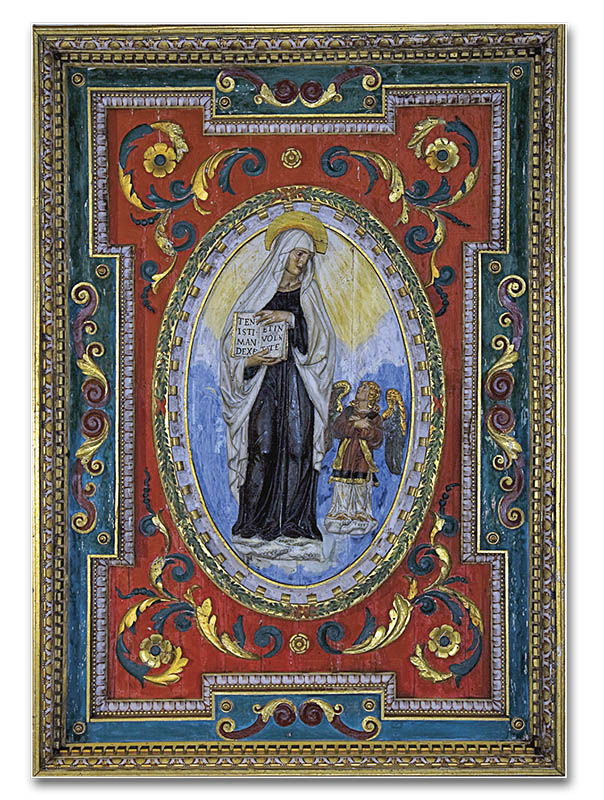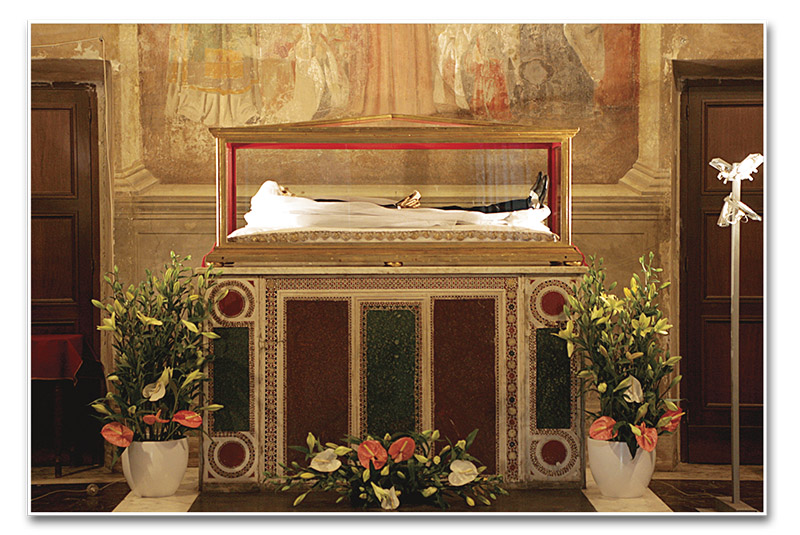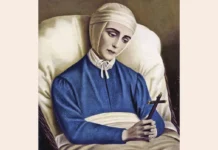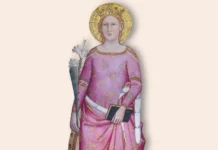A strong woman, like the one of Sacred Scripture, “the most Roman of all the saints” enlightened souls and aided the underprivileged in one of the most turbulent periods in the history of the Church.
The Divine Saviour established His Church upon strong foundations: “You are Peter, and upon this rock I will build my Church, and the gates of hell will not prevail against it” (Mt 16:18). Yet, over the course of history, the infernal legions have not ceased to attack this invincible rock.
One of these assaults began with the political and social upheavals that forced Pope Clement V, in 1309, to relocate the Holy See to the French city of Avignon, where Peter’s successors remained until 1376. A long period of turbulence culminated in the Great Schism of the West (1378-1417).
The emergence of the Schism further aggravated the situation to such a degree that the Eternal City was reduced to a pitiful state, afflicted by wars, famine and plagues. Within this context a young lady of high nobility stood out like a luminous angel of charity: St. Frances of Rome, who, through her exceptional efforts on behalf of the poor and sick, won the honorary title of Advocata Urbis (Patroness of the City).
Precocious piety
Frances was born in 1384 to a wealthy Roman patrician family. Her parents, Paulo Bussa de Leoni and Jacovella de Broffedeschi, provided her with an excellent Christian education. From her earliest years, she accompanied her mother in all her pious practices, such as abstinence, prayers, spiritual readings and visits to the churches where indulgences could be obtained.
She often went to her mother’s favourite church, the Basilica of Santa Maria Nova, under the care of the Benedictine monks of Mount Oliveto. There, as a child, Frances began receiving spiritual direction from Frei Antonio di Monte Savello, to whom she confessed every Wednesday.
At 11 years of age she expressed her desire to consecrate herself to God through a vow of virginity. Her leaning toward a monastic life became evident when—at her spiritual director’s recommendation, to confirm her vocation’s authenticity—she began practicing, at home, some austerities characteristic of certain feminine religious orders. Her father, however, opposed these childish undertakings, because he already had promised her in marriage to Lorenzo Ponziani, a wealthy youth of noble blood and good repute.
Exemplary spouse
Obedient and docile, she followed her confessor’s counsel by marrying the fiancé her father had chosen. At 12 years of age she took up residence in the Ponziani Palace, her new home. Although her new family welcomed her joyfully, she could not hide her sadness at being unable to follow her vocation. She soon won the confidence of her sister-in-law, Vanozza, the wife of Lorenzo’s eldest brother, who became her inseparable companion in all her acts of piety.
Frances was always an exemplary wife. At her husband’s request she appeared in public with the bearing of a Roman lady, exquisitely dressed and adorned with beautiful jewels. But beneath these she wore a coarse tunic of common fabric. She dedicated her free time to prayer, and never neglected the practices of the interior life. She transformed one of the palace’s rooms into an oratory, where she spent long hours in nocturnal vigils, accompanied by Vanozza. Worldly people mocked her, but her family considered her an “angel of peace.” 1
The designs of Providence
To her entire family’s alarm, Frances contracted a serious illness three years after her marriage. The sickness lasted a year. She was not afraid, however, for she had placed her life in God’s hands with complete resignation. During this trial, St. Aleixus appeared to her twice. On the first occasion, he asked her if she wanted to be cured, and on the second he told her, “God wants you to remain on earth to glorify his name.” 2 Then, placing his golden mantle over her, he restored her health.
This sickness led her to meditate deeply on Providence’s plans for her. After she had recovered fully, she decided, together with Vanozza, to lead a life in keeping with the Gospel, renouncing vain amusements and dedicating more time than she had before to prayer and charitable works.

Angelic protection, demonic attacks
During this time God sent a special angel to guide Frances along the path of purification. She could not see him, but he nonetheless remained at her side and manifested himself through clear signs. In addition to being a friend and counsellor, he was also a vigilant admonisher, who punished her when she committed the least fault. Once, when Frances failed to end a superficial and frivolous conversation out of human respect, he slapped her in the face with such force that the sound was heard throughout the whole room, and the mark remained for several days!
The devil spared no effort to disturb her life and, above all, to impede her sanctification. Because the saint always overcame his temptations, he frequently resorted to direct attacks. Once, when Frances and Vanozza were returning from St. Peter’s Basilica, they chose a shortcut because it was quite late. When they reached the banks of the Tiber, they stooped to take a drink. Pushed by an invisible force, Frances fell into the river. Vanozza jumped in to save her and was also dragged away by the current. Sensing their mortal danger, they turned to God, and at the same moment found themselves once again on the riverbank, safe and sound.
Model mother and housewife
With the birth of her first son, John Baptist, in 1400, she did not hesitate to set aside some of her mortifications and pious exercises to care for him. Her motherly love was united with the firmness of a good educator in correcting his childish displays of wilfulness, stubbornness and anger, without ever giving in to his tears of impatience. She was also an ideal mother to John Evangelist and Agnes, born some years later.
Her angel helped her to live her married life with love and dedication, toward both her husband and children. She fulfilled her duties as housewife perfectly, understanding that the sacrifices imposed by daily chores were part of the purification necessary in this life, and that they were more important than personal mortifications. Such was her dedication that, in 1401, when her mother-in-law died, the elder Ponziani entrusted Frances with the administration of the palace. The young woman showed much competence, intelligence and, especially, goodness in carrying out this responsibility.
She organized the many household servants’ work in such a way that they had time to fulfil their religious obligations. She provided for their material needs and encouraged them to live a truly Christian life. Whenever one fell ill, Frances acted as nurse, mother and sister. If the illness proved to be serious, she sought spiritual assistance from a priest, regardless of the day or hour.
Wonders wrought during her lifetime
Rome was beset by famine around the year 1413. Frances’ father-in-law became alarmed with her unabated generosity toward the underprivileged, and prohibited her from giving away portions of the provisions he had reserved for the family; so Frances began to seek alms for them. One day, seized by a sudden inspiration, she went with Vanozza to an empty cellar in the palace to search for any wheat that remained among the straw. They painstakingly gathered a few kilos of the much sought-after grain. Soon after the two had left, Frances’ husband entered the cellar and, to his wonderment, found 40 sacks, each containing 100 kilos of ripened, golden wheat!
A similar prodigy took place during this same period. In an effort to bring a little wine to the poor, Frances gathered up the meagre remains from a barrel. As she emptied it, it became miraculously filled with excellent wine.
These wondrous happenings helped nurture in Lorenzo a reverential and loving respect for his wife. He gave her full freedom to use her time for apostolic works and to exchange her beautiful garments and jewels—which she immediately sold to give the money to the poor—for simple and unassuming clothing.
Wars and tribulations
Many trials yet awaited her. The political situation on the Italian Peninsula and the crisis stemming from the Great Western Schism brought her much suffering. Rome was divided into two groups, which engaged in a bloody war; in favour of the Pope were the Orsini. Lorenzo belonged to this faction. On the other side, the Colonna supported Ladislau Durazzo, the King of Naples, who invaded Rome three times. Lorenzo was gravely wounded in a battle during the first invasion, and was healed through his wife’s faith and dedication. During the second incursion, in 1410, troops pillaged the Ponziani palace and confiscated the family’s possessions. Still worse, Frances saw her husband and son, John Baptist, sent into exile.
In 1413 and 1414, the capital of Christianity was pillaged and reduced to ruins. A new scourge, the plague, further aggravated the situation. The saint transformed the palace into a hospital and personally cared for the terrible disease’s victims. She was an angel of charity in an unhappy city beset by misfortune.
The plague also took its toll on her family. In 1413 her youngest son, Evangelist, died, followed by little Agnes a year later. Frances, too, eventually succumbed to the disease, but was miraculously cured.

Visions and supernatural gifts
In the same year, 1413, her recently deceased son appeared to her, with a young man of similar size and apparently the same age, but incomparably more beautiful, at his side.
“Is it really you, my dearly beloved son?” she asked.
He replied by saying that he was in Heaven, together with the splendorous archangel that God had sent to help her on her earthly pilgrimage.
“Day and night you will see him at your side and he will help you in everything,” he added.
The heavenly spirit radiated such light that Frances could read or work at night, as if by the light of day. He also illuminated her way when she had to go out at night.
By this archangel’s light she could see the most intimate thoughts inside people’s hearts. She also received the gift of discernment of spirits and of counsel, which she used to convert sinners and redirect the straying to the right path.
God blessed her with numerous other visions; the most impressive of which were those of hell. She saw, in detail, the torments that punish the condemned, according to the sins they have committed. She observed the devils’ hierarchical organization and the functions of each demon in the work of damning souls—a parody of the Angelic choirs’ hierarchy. Lucifer is the king of pride and the leader of all. She even saw how acts of virtue practiced by good souls torment these miserable creatures and thwart their earthly actions.
Apostolic life
Peace was re-established in the Eternal City with the death of King Ladislau. Frances’ husband and her son, John Baptist, returned from exile, and the Ponziani family recovered their possessions that had been unjustly confiscated.
Through prayers and inspired words, the saint convinced Lorenzo to make peace with his enemies and turn to a life of perfection. After her son’s marriage, she entrusted her daughter-in-law—whom she had converted—with the administration of the palace so she could dedicate herself entirely to works of charity and apostolate.
Lorenzo left her free to found an association of secular religious, on the condition that she continue living at home and guiding him along the path of holiness. Under her spiritual director’s guidance, she founded a society called the Oblates of Mary, modelled on the Benedictines of Mount Oliveto. On August 15, 1425, Frances and nine other ladies offered themselves to God and the Blessed Virgin, without pronouncing solemn vows. Each followed the evangelical counsels in her own home; they met together in the Basilica of Santa Maria Nova to listen to the words of their foundress, who was, to them, a guide and model to imitate.
Some years later, Frances received the inspiration to transform this society into a religious congregation. She acquired the Tor de’ Specchi building and, in March of 1433, 10 Oblates of Mary were clothed in habits and began living a communal life there. In July of the same year, Pope Eugene IV erected the Congregation of the Oblates of Mary, a name that was later changed to the Congregation of the Oblates of St. Frances of Rome. It was a new and original institution for its time: people who were religious without vows or cloister, and who lived an austere life committed to a genuine social apostolate.
Because of the constraints of married life, Frances could fulfil her great desire to be a religious only after her husband’s death, in 1436. She entered as a postulant in the congregation she had founded. However, the community’s chapter and her spiritual director obliged her to accept the offices of superior and foundress.
She saw Heaven open and the Angels descending
She lived in the convent for only three years. In 1440, she had to return to the Ponziani palace to care for her son, who was gravely ill. She developed an acute case of pleurisy, and remained there, no longer having the strength to leave. She felt her end approaching. She suffered greatly for one week, yet gave final counsels to her spiritual daughters and bade them farewell.
On March 9, after thanking her director, Fr. Giovanni, personally and on behalf of the entire community, she expressed her desire to pray Vespers of the Office of the Blessed Virgin Mary. With her eyes beaming, she said that she could see Heaven open and the Angels coming to claim her. With a smile illuminating her face, her soul departed from earth.
When raising her to the honour of the altars, in May of 1608, Pope Paul V described her as “the most Roman of all the saints.” 3 And St. Robert Bellarmine—the cardinal, whose vote was decisive in her canonization—declared in the consistory, “The proclamation of Frances’ sanctity will be of great benefit for many different classes of people: virgins, married women, widows and religious.” 4
Four centuries later, Cardinal Angelo Sodano drew this portrait of her: “Reading her life, we seem to encounter one of those strong women, of whom Sacred Scriptures and the pages of the history of the Church are replete. […] Although a woman of action, Frances drew from an intense prayer life the strength necessary for her social apostolate.” 5
A precious counsel for all of us: “from an intense prayer life” we receive the strength to carry out our works of apostolate. ◊








